Research of motives for formation of corporate culture of students in the context of the paradigm of cognitive psychology
Kateryna Brovko1*, Valentyna Ternopilska2, Nadiia Chernukha3, Alla Zagorodnya4, Ivan S. Bakhov5
1 Borys Grinchenko Kyiv University, Kyiv, Ukraine. 2 National Academy of Pedagogical Sciences of Ukraine, Kyiv, Ukraine. 3 Taras Shevchenko National University of Kyiv, Kyiv, Ukraine. 4 National Academy of Pedagogical Sciences of Ukraine, Kyiv, Ukraine. 5 Interregional Academy of Personnel Management, Kyiv, Ukraine.
ABSTRACT
This research highlights the issues of diagnostics of the state of formation of cognitive processes concerning the formation of motivation of the corporate culture of university students. The objectives of the article are to disclose characteristics of the corporate culture of students; study of the leading motives for the formation of the corporate culture. Diagnosis allows studying the level of knowledge of students about the cognitive and semantic aspects of the corporate culture of personality, to determine the motives, which was used by students in the adoption of corporate norms, values of the university environment, as well as to trace their attitude to the corporate culture of the university. The methodology includes analysis and synthesis (for the characteristics of conceptual and categorical apparatus of the research); mathematical and statistical processing of research results for the analysis of the obtained data, establishing quantitative and qualitative indicators of the results of the study, computer processing of experimental data. Peculiarities of diagnostics of the state of formation of cognitive processes of formation of motivation of corporate culture of university students are given. The essence of the concepts of "corporate culture of personality", "cognitive processes", "motivation" was disclosed. The essence of theories of motivation and cognitive theories of emotions according to the process of forming the motivation of the corporate culture of students were outlined. Indicators of the formation of cognitive processes concerning motives of the corporate culture of students were singled out. The results of the performed diagnostics were described.
Keywords: corporate culture, cognitive processes, motivation, students, university.
Introduction
The strategic goal of modern state policy in the field of higher education was identified to prepare highly qualified and motivated professionals focused on continuous professional development, the development of the organization in which you work, the adoption of its goals, mission, and vision. Given this, there is a need to carry through a practice-oriented search for possibilities of the organization of the system of special measures aimed at the formation of a corporate culture of future
specialists. The problem of motivation as an incentive for students to express corporate culture naturally originates from the theory of cognition. A significant contribution to the development of this problem has been made by cognitive psychology, which combines the full range of psychological processes, emotions, and developmental processes, as well as various areas of personality behavior.
The purpose of this article is the monitoring of cognitive processes in the formation of motivation of the corporate culture of university students.
Objectives of the study are to disclosure characteristics of the corporate culture of students; study of the leading motives for the formation of corporate culture; the study of the level of awareness of the importance of corporate culture as an important cognitive, personal and professional education specialist.
The analysis of researches and publications. The theoretical basis of the study consists of the provisions and conclusions of the theories and concepts of domestic and foreign scientists: specificity of formation of corporate culture [1-7]; characteristics of the motivational sphere of personality U. Isahrabiu [8], N. Magzumova [9], S. Makushkin [10], A. Maslow [11], V. Ternopilska [12]; the influence of cognitive processes on the process of motivation formation [13-15].
The initial methodological position of cognitive psychology is the interaction of affective and cognitive processes. This naturally leads to the study of the influence of cognitive processes on the formation of corporate culture motivation of university students.
Focusing on the impact of cognitive processes of motivation corporate culture of students, it is useful to single out cognitive theories of emotions, which form the fundamental basis of personality motivation. R. Lipper in his reasoning identifies emotions with cognitive processes. In his opinion, emotional processes can be considered as one of the types of perceptual processes. E. Deci points to the primacy of the emergence of intrinsic motivation concerning cognitive processes [14]. As a representative of cognitive psychology, he considers human perception and thinking as determinants of motivation: "Knowledge is the cause of the behavior." Thus, recognizing the primacy of motivation concerning cognitive processes in terms of its origin, E. Deci argues its secondary nature in real life as dependent on cognitive processes [13]. J. Nuttin suggests ways of overcoming existing in the cognitive psychology gap between affective and cognitive processes [15]. According to J. Newton, affective and cognitive processes together create objectively directed values-structures: tasks, behavior plans, and interests. These structures were formed by motivational processes based on basic needs, as well as with the participation of information processes and learning. Thus, the data obtained in cognitive psychology on the motivating function of knowledge, determine the emergence of motives for the formation of the corporate culture of the subjects depending on the level of their awareness.
Corporate culture is referred to as a system of shared beliefs, beliefs, values, what is the direction to support the corporate behavior of a person [16]. It is an important mechanism that determines the motivation, pattern of behavior, self-identification of the individual as a member of a particular organization. Corporate culture is the unifying element of the employees in the organization as to the goals and objectives and to achieve their own goals and targets. The higher the level of corporate culture, the more effective it is produced in the content and nature of interaction with other entities of the organization [17].
It should be noted that corporate culture is a set of beliefs, values, and learned ways of solving the real problems that have emerged since the existence of the organization and reflected in different material forms and the behavior of its members. Corporate culture passes the internal climate of the organization and also reflects its inherent customs [7]. Scientists consider corporate culture as a powerful strategic tool facilitating orientation of all subdivisions of organization and individuals on common goals, the motivation of staff initiative, ensure loyalty, and facilitate communication [4, 9].
A person’s personality is characterized by the motives of his behavior and actions, rather than the external manifestation of behavior. Motivation follows from a person’s needs and is the cause of his conscious or unconscious behavior [8]. Therefore, motives are a stable psychological cause of human actions [18-21].
According to V. Shapovalova, a motive or motivation is, above all, the incentives encourage the person to certain actions [5]. Components of motivation are needs, interests, motives, attitudes, and values. The formation of the value orientations that motivate, regulate, direct the person, in particular, students on the formation of his values related to corporate culture. Corporate culture manifests itself in responsible relation of the expert to the corporate standards and values in the organization, the decisions of its members the goals, mission, vision. Because the main source of corporate knowledge and skills of students is an educational environment of the University, there is a need for the presence of motivation in them for the formation of corporate culture, the observance of corporate norms and values.
Methods
The theoretical and methodological basis of the research is a systematic approach to study fundamental aspects of the corporate culture. For the solution of the tasks used General scientific methods such as the method of analysis and synthesis (for the characteristics of conceptual and categorical apparatus of the research); scientific abstraction, induction, and deduction (generalizing the Ukrainian and foreign experience of formation of corporate culture); Special techniques: mathematical and statistical processing of research results for the analysis of the obtained data, establishing quantitative and qualitative indicators of the results of the study, computer processing of experimental data, etc. using a combination of methods has allowed obtaining objective information on the state of formation of a corporate culture of students of the University; abstract-logical (a theoretical generalization of the study results and conclusions). The results are presented using charts and graphic images.
The study involved 152 students of the Borys Grinchenko Kyiv University and Pavlo Tychyna Uman State Pedagogical University. In the process of sampling, we used random sampling of subjects from the possible set of students, i.e. each student had the same chance to get into the selection.
Among the diagnostic methods were selected: questionnaires, tests, surveys, interviews, observation, interviews, the generalization of independent characteristics, a situation of moral choice and analysis of life situations; quantitative and qualitative data processing. The use of complex methods has allowed obtaining objective information about the state of development of the motivational sphere of the corporate culture of University students.
For validation of the results, and given that corporate culture is a complex, comprehensive, integrative education and has significant importance in the system of motivation of the individual, a complex of methods for diagnosing the motives of corporate culture formation of University students were used.
The chosen methodology reflects the issues which allowed the determination of the motives of students in the adoption of corporate norms and values of the University environment. The motives of the students were determined by the following indicators: value attitude to cultural norms, rules, models of behavior accepted in the educational environment of the University; the presence of positive emotional attitude and the subjects of the educational process, corporate identity, logo, flag, colors, clothing; awareness and acceptance of the mission, corporate standards and rules of conduct; in humanistic setting for interaction. To determine the reliability of the results of the experiment, the statistical processing of the data obtained at the end of the experiment was carried out. To objectively evaluate the results of the experiment, the criterion χ2 was used. Following the algorithm of application of the criterion χ2 , the null and alternative hypotheses were formulated: H0 – states the existence of a sufficient level of formation of the motivational sphere of university students to identify their corporate culture. H1 – states the lack of a sufficient level of formation of the motivational sphere of university students to identify their corporate culture. Therefore, for the significance level α = 0.05 and three degrees of freedom, the critical value is 7.82.
Results and Discussion
Initial theories of motivation were formed based on the historical experience of human behavior and the use of simple incentives coercive, material, and moral incentives. Among the most famous theories of motivation are theory “X-Y-Z” developed by F. Taylor and supplemented by D. McGregor, according to which individuals form a diverse group of people and require different motives and incentives. Theories "X", "Y", "Z" - are three unrelated theories of staff motivation. Theory "X" assumes that most people are irresponsible and lazy, and the only factor that makes them work is only the physiological needs of existence. Theory "Y" describes the average person who is intrinsically motivated to work, active, and responsible. Theory "Z" covers people who are valued for teamwork. In human motives, social and biological needs are combined.; theory of needs.
A. Maslow is based on the behavioral doctrine - the study of human behavior, abstracting from the study of consciousness, thinking; theory acquired needs.
D. McClelland connected with the study of the influence on human behavior needs achievement, participation, and power; the theory of two factors F. Herzberg, according to which were the factors influencing human labor (factors of working conditions and motivating factors; expectancy theory of V. Vroom is based on the fact that the active demand is not the only a necessary condition of human motivation to achieve certain goals; a theory of justice of S. Adams argues that people subjectively determine the received compensation to the spent efforts and then correlate it with the remuneration of other people doing similar work; the theory of Porter & Lawler is a comprehensive procedural theory of motivation, which includes elements of the theory of expectations and fairness [10].
It is worth noting that the motives of University students for corporate culture, constitute a complex of motivations for their cooperation, communication, the formation of active life position. First of all, to external motives of the corporate culture of students, social motives are widely represented (the desire to occupy a certain place in society, increase social status, motives of personal self-realization and prestige) and narrowly represented (the desire to have a certain status in a particular social group). To include the explanation of cognitive, self-assertion, identification with another person, self-development and self-actualization (we are talking about self-improvement, the desire to increase their capabilities to realize individual potential), affiliation (the desire to establish relations with other people), personal growth (the ability to control himself in all situations) [12, 22, 23].
Thus, the formation of the corporate culture of university students is due to a complex hierarchical system of socially significant and personal motives; in it, the highest level of motivation is the transformation of the need into a conscious interest, personal value, and values - the purpose of the activity. The development of motives of the corporate culture of students is carried out in the direction from external motivations to the emergence of their motivational formations. But the formation of the corporate culture of university students should be said only if, in the process of interaction, communication with another person for them is the object of value, which is manifested in the recognition of its needs and interests; focus on the positive in man.
The development of students’ motivation for the development and deepening of knowledge in corporate culture is in the process of the classroom and extracurricular activities of the University. Therefore, the main objective is the adaptation of students to the educational environment of the University; their realization of the importance of observing the corporate culture; the formation of students’ motives and values of the corporate culture.
For the formation of positive motivation of students and deepening their knowledge of corporate culture at Borys Grinchenko Kyiv University “Days of the faculty”, Department week are held, during which students are attracted to the organization and conduct of the various flash mobs, exhibitions, fairs, auctions, master-classes. A week before the “University Day”, which coincides with the anniversary of the birth of Borys Grinchenko, Grinchenko’s decade starts at the University, in which at the university-wide and at the level of departments an art exhibition, themed guest activities, creative projects, gala evenings, tournaments, marathons, competitions of student research papers, guest lectures, scientific seminars, student research Grinchenko readings, round tables, author’s Studio, quests, festivals of student creative projects, meetings of student societies, trips to the Museum of Borys Grinchenko for scientific and pedagogical workers, training, exhibitions, a contest for the best interpretation of the words “Dictionary of Borys Grinchenko and modernity”, quiz “We are Grinchenko’s”, exhibition-presentation before the birthday of Borys Grinchenko, etc are held. Grinchenko’s decade ends with a concert program dedicated to Borys Dmytrovych Grinchenko, where The Rector of the university awards the leading teachers with the highest university award - the medal of Borys Grinchenko, and the best students - with the nominal scholarship of Borys Grinchenko.
Also, a significant factor that affects the formation of the corporate culture of students in Borys Grinchenko Kyiv University is the holding of dedication to the students of the University, during which they get acquainted with the hymn of the University, its mission, slogan, corporate paraphernalia. The rector of the University gives freshmen a symbolic “Student ID” and the welcome speech sets them to fruitful cooperation. Adapted to domestic conditions of the educational environment of the University, students participate in the annual festival of freshmen “Here we are!”, on which freshmen and the team of the Student Council, choosing the thematic basis of the performances are satisfied with a brilliant performance in the University auditorium and will present a variety of creative performances, comedic and musical performances. Grinchenko Educational Talks were also launched - an entertainment and educational event for high school students, aimed at disseminating information and advertising information about Grinchenko University; a festival for freshmen “Here we are!”, the festival of educational leadership CLEVER, “Open Day”, where entrants are provided with information about the features and benefits of learning and extracurricular activities at the university, present “Applicant's Guide”, show footage from the film “About the University” ». Comprehensive information about the university is offered in a concert format, which includes presentations of the Institutes, bright concert numbers with the participation of Grinchenko students, who invite high school students to join the Grinchenko family; weeks of the department, competitions of KVN teams ("Club of the Funny and Inventive People"), Miss & Mister Grinchenko University competitions, flash mobs, social project “With Kyiv and for Kyiv!”, excursions, exhibitions, thematic evenings, clubs, International Academy of Service Leadership, actions, fairs.
Such forms of work are designed to educate a new type of modern young man, patriotic, spiritual, purposeful, and able to freely choose a life path with established corporate values.
Analysis of the results
One of the indicators of the formation of the motives of the corporate culture of students is a valuable relationship to cultural norms, rules, models of behavior accepted in the educational environment of the University, the presence of the emotionally-positive relation to corporate identity, logo, flag, colors, clothing, the awareness and acceptance of the mission, corporate standards, and rules of conduct. To diagnose these indicators were used the author's questionnaire “the Attitude towards corporate culture.” According to the study idea of the unity of the faculty, “see Fig. 1”, 53,3% in the EG and 53.2% of the CG interviewees said that the faculty at which they study, is the only team of teachers and students who work closely together, 36,0% EG and 36.6% of CG – slightly agree, 6.6% of the EG and 6.6% KG – difficult to answer, a 2.6% AG and 2.5% of CG – rather disagree, 1.3% of the EG and 1.1% CG absolutely disagree.
Regarding the issue “It seems to me that the teachers and the part of the students who aim to get a profession and good knowledge are united”, 49.3% of the EG and 49.1% of the students CG fully agreed with the statement, 30.6% of the EG and 20.3% CG – slightly agree, 13.3% of the EG and 14.8% CG – difficult to answer 4.6% of the EG and 4.2% CG – rather disagree, 2.0% of the EG and 1.6% CG – I totally disagree.
With the statement that faculty constitutes two different enterprises: teachers and students 30,0% EG and 31.6% CG – rather disagree, 26.6% of the EG and 25.6% CG – difficult to answer, at 20.0% EG and 19.8% CG – more is 13.3% of the EG and 12.8% CG – I totally disagree, 10.0% of the EG and 10.2% CG – I agree fully.
Regarding the fact that students are more united among themselves than teachers, 33.3% of the EG and 35.2% of the students CG replied that most do not agree with the expressed statement, 33.3% of the EG and 32.4% CG absolutely disagreed, 12.0% in the EG, 11.6% of CG difficult to answer, 12.0% in the EG and 11.8% CG replied that most agree, others 9.3% of the EG and 9.0% CG fully agreed.
On the allegation that the faculty teachers and students live and work separately, not together, 40,0% of the EG and 39.4% of the respondents of the CG totally agreed, 29.3% of the EG and 30.8% CG rather not agree, 14.0% of the EG and 13.8% KG refrained from the exact answer, 10.0% of EG, 9.8% of CG responded that I tend to agree, and the rest 6.6% of the EG and 6.2% CG fully agree with that.
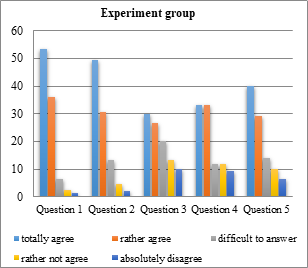
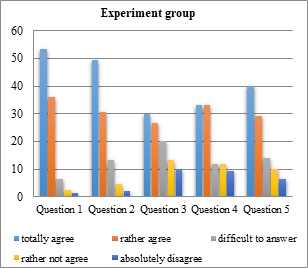
Figure 1. My idea of the unity of the faculty (in %)
About who is more united among themselves, teachers, or students, 42.6% of the EG and 41.5% of the CG respondents more prone to agree with what the teachers are interconnected and support each other in the framework of the University in all 38,0% EG and 39.6% of the students CG fully agreed with the statement, 9.3% of the EG and 9.0% CG difficult to answer, and 6.6 % EG, 6.3% of CG rather disagree, other 3.3% in the EG and 3.6% kg of absolutely not agree, “see Fig. 2”.
Regarding the mutual assistance of teachers to each other, 44.6% of the EG and 45.2% CG replied that mostly agreed with the statement that teachers support each other, but do not criticize each other within the University, to 22.0% EG and 21.8% KG fully agreed, 20.6% of the EG and 20.1% of CG find it difficult to give a precise answer, 8.6% of the EG and 8.1% CG rather did not agree, a 4.0% EG and 4.8% of CG completely disagree.
Regarding the fact that the teachers are united among themselves and support each other at least in respect of unity of requirements to the students or 32.0% EG and 31.4% of CG answered that they fully agree with that, 35.3% of EG and 37.1% of CG rather agree to 22.0% EG, 21.8% of CG undecided, 8.0% of the EG and 7.7% CG absolutely disagree, 2.6% of EG and 2.0% of CG rather not agree.
“I believe that the stronger the Association and the community of teachers are felt within the faculty than the University....”, 36.6% of the EG, 35.5 per CG of the respondents answered that they rather agree with the above, 26.6% of the EG, 28,5% CG difficult to answer, 27.3% of the EG and 26.9% totally agree CG, 6.0% in the EG and 5.9% CG rather disagree, 3.3% in the EG and 3.2% CG absolutely disagree.
“In my opinion, one of the lecturers do not support one within the University, they are not familiar with each other. The best argument is the various demands of teachers to students”, 50.6% of EG and 50.1% of CG interviewees agree that teachers do not support each other within the University, 27.3% of the EG and 28.4% CG rather not agree to 22.0% EG and 21.5% CG difficult to answer.
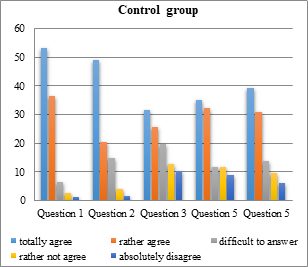
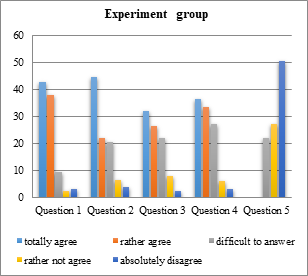
Figure 2. Are there are teachers representatives of the University as a unified educational corporation? (in %)
Analyzing the respondents ' answers, we can conclude that the majority of students believe that teachers and students are interconnected and work closely together to achieve a common goal. Also, a significant number of respondents believe that not only the students and teachers are united among themselves but also between teachers themselves. A unifying factor, in their opinion, is the unity of requirements, the orientation of students on the value of the University environment, they develop their enterprise skills.
To determine the frequency of manifestations of corporate culture in relationships with peers, students were asked to answer the questions of the author’s questionnaire “Corporate culture”, therefore 56,0% EG and 54.3% of CG interviewees said that quite often corporate culture in relationships with peers, because the support of corporate culture and fosters positive interpersonal relationships, 31.3% of EG and 32.8% of the CG responded that manifest corporate culture to peers, in some situations, because sometimes people don't deserve it, they stressed that the need to treat people so as they are to you, 10,0% EG and 11.1% CG noted that always show the corporate culture in relationships with peers because they learn together and should therefore respect each other, other 2.7% of the EG and 1.8% CG do not show the corporate culture concerning peers, because they do not see any sense in this. To identify the corporate culture concerning teachers, 46.7% of EG and 44.8% of the CG interviewees said that exhibit corporate culture in some situations, because they think it primarily depends on teachers, 23.3% of the EG and 24.9% CG noted that exhibit a corporate culture quite often, in their opinion, it helps to come to an understanding, the last of 30.0% EG and 30.3% CG always show the corporate culture in relationships with teachers through respect for their professionalism.
The importance of the corporate culture of a University student, 73.3% of the EG and 71.2% CG interviewees noted that it is necessary to maintain cohesion and team spirit, 14.6% of EG, 15.4% of CG – focused on the fact that corporate culture helps to improve the level of organization of educational and extracurricular activities of University students, 10.0% of the EG and 10.3% CG noted that it is necessary for the successful adaptation of students to life University, a 2.0% EG and 3.1% of CG for the formation and maintenance of subjects of the educational process of some private values.
Regarding the system of values professed by students/teachers at the university, 73.3% EG and 71.7% CG answered that it is knowledge of the university symbols, its anthem, traditions, values, compliance with corporate clothing standards, 18.6% EG and 19, 0% CG - mutual assistance, sociability, 4.7% EG, 5.2% CG - equality, democracy, the last 3.3 EG, and 4.1% CG emphasized the importance of such a value is honesty.
Regarding students' views on whether teachers reproduce the system of values that is formed at the university, 56.6% of EG and 55.2% of CG answered - rather yes, 30.0% of EG and 31.4% of CG - yes, 13.3 % EG and 13.4% CG I hesitate to answer “see Fig. 3”.
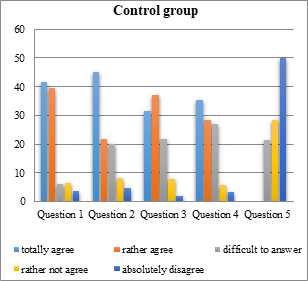
Figure 3. Reproduction of the university value system by teachers
The last question of the questionnaire was aimed at identifying the views of students on the students to reproduce the value system that formed at the University. Therefore, 50,0% EG and 48.7% CG in their responses indicated that they find it difficult to answer the question, 26.6% of the EG and 29.4% CG – rather, 23.3% of the EG and 21.9% CG – so “see Fig. 4”.
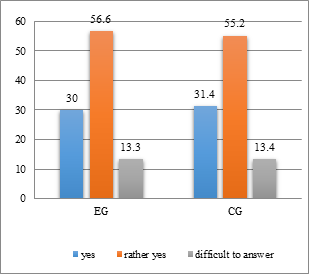
Figure 4. Reproduction of the university value system by students
Thus, it can be argued that a significant number of students adheres to social norms and rules of behavior in the manifestation of their corporate culture in an interpersonal relationship communication is the desire to avoid unpleasant situations and aiming at the conquest of the positive attitude of others. Also, the students showed a high level of formation of moral qualities such as understanding and empathy of the inner world of another person, that is, motifs and value relationships.
Conclusions
The results of the conducted research we can draw the following conclusions. The calculated data according to the formula χ2=0,508 does not exceed the critical value of 7.82, and therefore according to the rules of decisions in tax matters solutions, the values obtained refute the hypothesis H0 , and give reasons for acceptance of hypotheses H1 , which indicates a sufficient level of formation of motives for the formation of the corporate culture of students of the University.
However, the successful formation of the motives of the corporate culture of students of University is provided of creating a positive, emotionally-favorable educational environment, through the organization of subject−subject interaction of the participants; awareness of students of the importance of corporate culture, designing the content of corporate culture with the use of active technologies, forms, methods of training, based on principles of scientific character, links between theory and practice, systematic character, consistency, professional orientation, consciousness, and activity; directions informative providing of the process of corporate culture formation and development of professionally important personal qualities; the orientation of the content and forms of independent work on attraction of students to independent educational cognitive activity, self-correction, and self-control.
References
- Fralinger B, Olson V. Organizational Culture at the university level: A study using the OCAI instrument. Journal of College Teaching and Learning 2007; 4(11): 85–97.
- Koycheva T. Novel approaches to form the corporate culture in pedagogical universities. Computer Modelling and New Technologies 2014; 18(2): 286–289.
- Kovalevskyy S, Kosheva L. Research the Corporate Culture of Students Using Neural Network Models. American Journal of Neural Networks and Applications 2015; 1(2): 43–47.
- Ognevyuk V, Zhyltsov O, Morze N. Workshop for the textbook «I am a student». Kyiv: Borys Grinchenko Kyiv University, 2016.
- Shapolova, V. Definition of pedagogical conditions information of corporate culture in the higher technical school. Formation of responsible and highly spiritual leaders-managers as one of the priority directions of formation of the national humanitarian and technical elite. NTU «KhPI», 2015: 107–116.
- Syngaivska I. Corporate culture as a means of motivation work with person. Knowledge: International Journal Scientific and applicative papers 2014; 1-2: 168–172.
- Velecka S. Gibt es slowakische Unternehmenskultur? - Eine explorative Studie anhand von halbstandardisierten Interviews mit slowakischen Führungskräften. Hamburg: Diplomica, 2004.
- Isahrabiu U. The role of personnel management and worker’s motivation in an organization. IOSR Journal of Business and Management (IOSR-JBM) 2018; 20(4): 22-32.
- Magzumova N, Kolesnik A, Avanesov A. Intangible personnel motivation in order to improve the effectiveness of the organization. Scientific Bulletin of the Southern Institute of Management 2019; 1: 71-75.
- Makushkin S. Company’s personnel motivation. Revista Ecpacios 2019; 40(40): 23.
- Maslow A. Motivation and personality. Кyiv: PSYLIB, 2004.
- Ternopilska V. Modern tendencies of motivation of educational and professional activity of students. Bulletin of National University of Civil Defense of Ukraine 2012; 5(30): 141-144.
- Deci, E. Intransic motivation. New York: Plenum Press, 1975.
- Liper R. The motivational theory of emotion. In: Stacey С.L., DeMartino M.F. (Eds). Understanding human motivation. Cleveland: The World Publishing Company, 1963: 657-665.
- Nuttin I. Motivation and reward in human learning: A cognitive approach. In: Handbook of learning and cognitive processes, Vol. 3. Approaches to human learning and motivation. New Jersey: Psychology Press, 1976: 247-282.
- Brovko K. Technology of formation of corporate culture of students in the educational environment of the university. Intellectual Archive 2019; 8(1): 99–107.
- Brovko K, Ternopilska V. Corporate culture of personality: psychological aspects. Topical issues of contemporary science: Collection of scientific articles. Valencia: C.E.I.M., 2017: 176–178.
- Algahtani,F.D. Model for Predicting Physical Activity Barriers among College Students. Int. J. Pharm. Phytopharm. Res. 2020;10(2):43-49.
- Sarabi N. Nursing Students' Experiences from Two Methods of Teaching: Film Preparation and Demonstration of Physical Examinations. Int. J. Pharm. Phytopharm. Res. 2019;9(2):14-20.
- Abdelazeem AA, Atta AA, Elsayed SH. Barriers and Facilitators Facing the Male Students During the Baccalaureate Nursing Program. Pharmacophores. 2018 Jan 1;9(1):112-7.
- Maksymov O, Fedorova O, Yakovleva V, Gurov S, Fedorov M, Dubiaga S. Tutor's psychological readiness for professional activity in Ukraine. Journal Of Organizational Behavior Research. 2020;1(5):1-8.
- Ternopilska V. The role of self-government in development of leadership qualities among students. Problems of development modern science: theory and
practice: Collection of scientific articles. Madrid: EDEX 2016: 341–344. - Ternopilska V, Guk O, Zavhorodnia Y, Ryzhykov V, Snitka Y, Chernukha N. Variants of the educational paradigm in training of managers. Revista Espacios 2019; 40(29): 9.
Contact Meral
Meral Publications
www.meralpublisher.com
Davutpasa / Zeytinburnu 34087
Istanbul
Turkey
Email: [email protected]